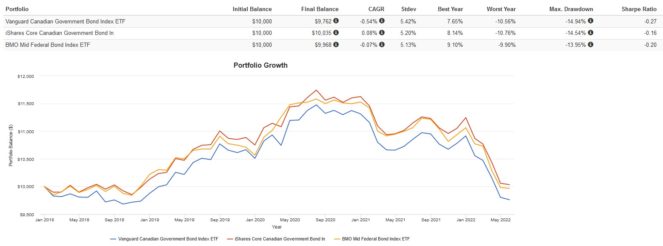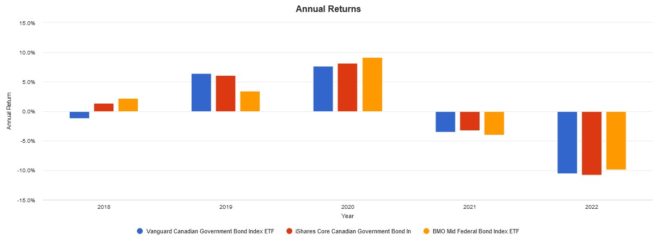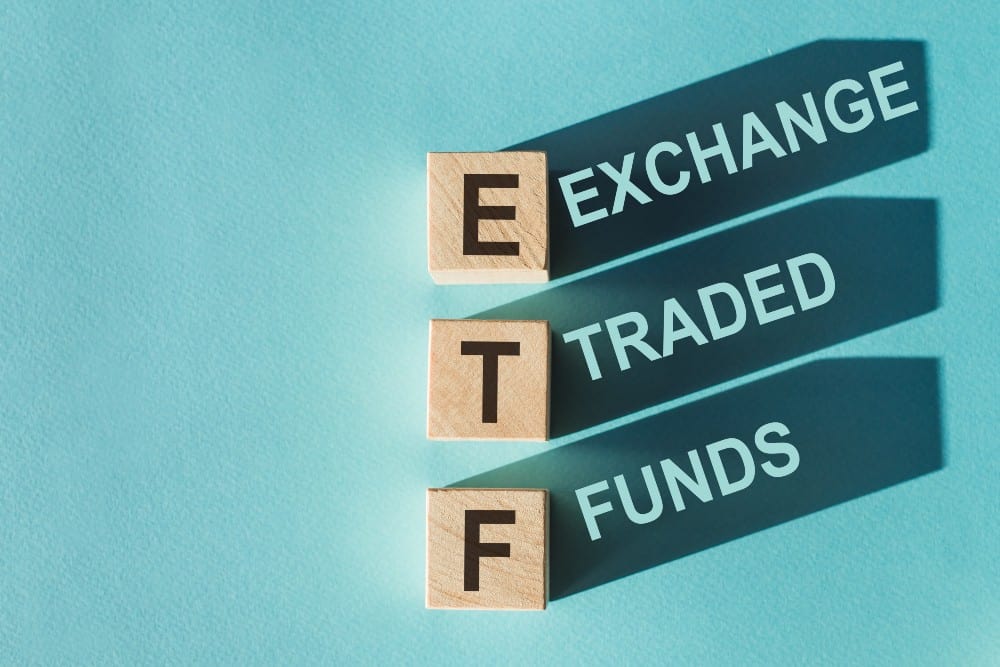Welcome to a series where I break down and compare some of the most popular exchange-traded funds (ETFs) available to Canadian investors!
Canadian investors looking for protection against equity risk can opt for a healthy allocation of AAA-quality Canadian government bonds, including federal, provincial, and municipal issues. Fund managers like Vanguard, iShares, and BMO Global Asset Management provide a set of low-cost, high-liquidity ETFs that offer exposure to a portfolio of government bonds.
The three tickers up for consideration today are Vanguard Canadian Government Bond Index ETF (TSX:VGV), iShares Core Canadian Government Index ETF (TSX:XGB), and BMO Mid Federal Bond Index ETF (TSX:ZFM). Which one is the better option? Keep reading to find out.
VGV vs. XGB vs. ZFM: Fees
The fee charged by an ETF is expressed as the management expense ratio (MER). This is the percentage that is deducted from the ETF’s net asset value (NAV) over time and is calculated on an annual basis. For example, an MER of 0.50% means that for every $10,000 invested, the ETF charges a fee of $50 annually.
VGV has an MER of 0.17% vs. 0.27% for XGB and 0.22% for ZFM. The clear winner here is VGV, which would cost $17 in annual fees for a $10,000 portfolio.
VGV vs. XGB vs. ZFM: Size
The size of an ETF is very important. Funds with small assets under management (AUM) may have poor liquidity, low trading volume, high bid-ask spreads, and more risk of being delisted due to lack of interest.
VGV currently has AUM of $58 million, XGB has $482 million, and ZFM has $257 million. Their underlying bonds are liquid, but in a crash, there could be liquidity issues like we saw in March 2020. In this case, XGB is the winner.
VGV vs. XGB vs. ZFM: Holdings
When selecting a bond ETF, investors should pay attention to three considerations. First, check the credit quality of the bonds. Ideally, we want bonds rated A, AA, and AAA. We don’t want junk bonds, as our goal here is to reduce volatility, not increase it.
Both VGV and XBG have at least 50% of their holdings in AAA federal bonds, with the rest mostly in AA provincial and municipal debt. ZFM, however, is the safest, with 100% of its holdings in AAA-rated federal debt.
Second, check the effective duration of the bond. This is a measure of how sensitive the bond is to interest rate movements. Bond prices move inverse to interest rates. For example, a bond with an effective duration of 2.46 years would lose approximately 2.46% if interest rates rose by 1%. VGV, XGB, and ZFM have average durations of 8.4, 8.0, and 7.43, respectively, making VGV the most sensitive, ZFM the least sensitive, and XGB is in between.
Finally, we look at the weighted average yield to maturity (YTM) of the bonds, which is the total return anticipated on a bond if held until maturity. This is influenced by the face price of the bonds as well as their coupon payments. VGV, XGB, and ZFM have YTMs of 3.2%, 3.7%, and 3%, respectively.
VGV vs. XGB vs. ZFM: Historical performance
A cautionary statement before we dive in: past performance is no guarantee of future results, which can and will vary. The portfolio returns presented below are hypothetical and backtested. The returns do not reflect trading costs, transaction fees, or taxes, which can cause drag.
Here are the trailing returns from 2018 to present:

Here are the annual returns from 2018 to present:

All three government bond ETFs performed very similarly. All spiked heavily during 2020 when rates were dropped and investors panic-bought them to offset equity risk. All lost substantially in 2022 due to rising rates and their intermediate durations.
The Foolish takeaway
My pick here is ZFM. It has a good balance of fees and AUM, and I think the lower duration will be advantageous in a rising-rate environment. I also prefer federal bonds, despite their lower yields, as the protection afforded in a crash is arguably greater. Still, VGV and XGB are good choices, too.








